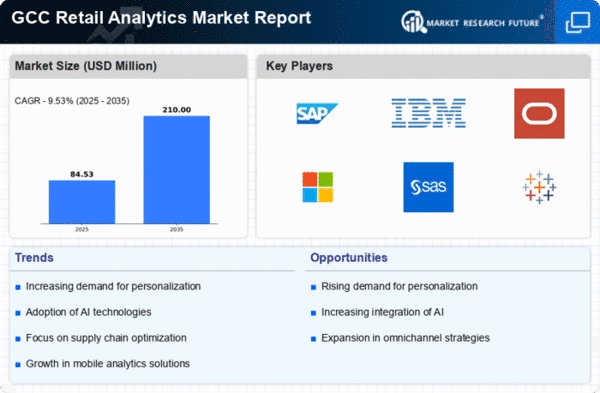Growing E-Commerce Adoption
The retail analytics market is experiencing a notable surge due to the increasing adoption of e-commerce platforms across the GCC region. As consumers increasingly prefer online shopping, retailers are compelled to leverage analytics to understand consumer behavior and optimize their online offerings. In 2025, e-commerce sales in the GCC are projected to reach approximately $30 billion, indicating a robust growth trajectory. This shift necessitates advanced analytics tools to track customer interactions, preferences, and purchasing patterns, thereby enhancing the overall shopping experience. Retailers are utilizing data-driven insights to tailor their marketing strategies. They also aim to improve inventory management and streamline supply chains. Consequently, the demand for sophisticated retail analytics solutions is likely to escalate, positioning this market for substantial growth in the coming years.
Investment in Advanced Technologies
The retail analytics market is significantly influenced by the growing investment in advanced technologies such as big data, artificial intelligence, and machine learning. Retailers in the GCC are increasingly recognizing the value of these technologies in deriving actionable insights from vast amounts of data. In 2025, it is estimated that spending on retail technology in the region will exceed $5 billion, reflecting a strong commitment to innovation. These investments enable retailers to enhance operational efficiency, optimize pricing strategies, and improve inventory management. Furthermore, the integration of advanced analytics tools allows for predictive modeling, which can forecast trends and consumer behavior with greater accuracy. This technological advancement is likely to propel the retail analytics market forward, as businesses seek to remain competitive in a rapidly evolving landscape.
Regulatory Compliance and Data Security
In the retail analytics market, regulatory compliance and data security are becoming increasingly critical drivers. As data privacy regulations tighten across the GCC, retailers must ensure that their analytics practices comply with legal standards. This necessitates the implementation of robust data governance frameworks and security measures to protect consumer information. Retailers are investing in analytics solutions that not only provide insights but also adhere to compliance requirements, thereby mitigating risks associated with data breaches. The market for data security solutions in retail is projected to grow by 20% annually, underscoring the importance of secure analytics practices. Consequently, the retail analytics market is likely to evolve, with a focus on solutions that prioritize data integrity and compliance.
Enhanced Customer Experience Initiatives
In the retail analytics market, enhancing customer experience remains a pivotal driver. Retailers in the GCC are increasingly focusing on personalized shopping experiences to foster customer loyalty and retention. By employing analytics, businesses can gain insights into customer preferences, enabling them to tailor promotions and product offerings effectively. For instance, data indicates that personalized marketing can lead to conversion rates that are 10-15% higher than traditional methods. As retailers strive to create seamless omnichannel experiences, the integration of analytics tools becomes essential. This trend not only aids in understanding customer journeys but also facilitates proactive engagement strategies. As a result, the retail analytics market is likely to witness heightened demand for solutions that support customer experience initiatives.
Rising Demand for Supply Chain Optimization
The retail analytics market is driven by the rising demand for supply chain optimization among retailers in the GCC. As competition intensifies, businesses are increasingly seeking ways to enhance operational efficiency and reduce costs. Analytics tools play a crucial role in this endeavor by providing insights into inventory levels, supplier performance, and demand forecasting. In 2025, it is anticipated that the market for supply chain analytics will grow by 25%, reflecting the urgency for retailers to streamline their operations. By leveraging data analytics, retailers can make informed decisions regarding stock management, logistics, and procurement strategies. This focus on supply chain optimization is likely to propel the retail analytics market, as businesses strive to achieve greater agility and responsiveness in their operations.

















